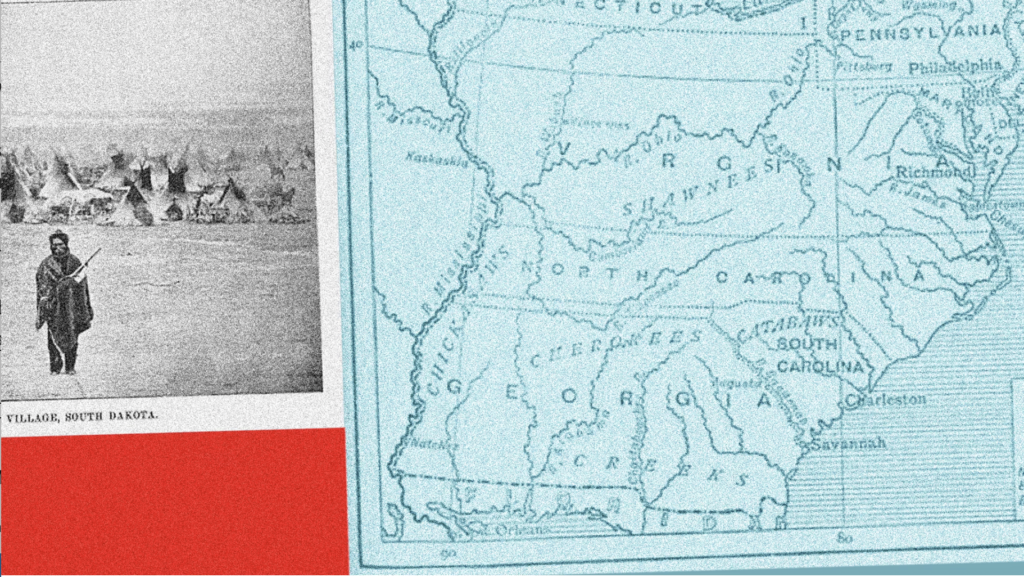By Surya Gowda
The land that the United States, Canada, and Oceania call their nations was once the different territories of thousands of indigenous groups who had their rights and livelihoods stolen from them. In many institutions and communities, there is rarely any acknowledgment of the people who tended the land before the colonizers and a lack of respect for those who believed they belonged to the land and therefore the land belonged to them. The indigenous presence was slowly wiped out and soon forgotten, only left with city names of settler towns.

In recent years, there has been a rise of events such as conferences, gatherings, concerts, and festivals, opening with a person reading a statement acknowledging the land they are on to the indigenous group that exists and existed on those territories. An indigenous land acknowledgment takes form in either a written and/or formal statement that “recognizes the past, present, and future of a particular location to understand our own place within the relationship” (Native Governance Center). For generations, indigenous people have been practicing acknowledgments but the implementation in western societies has been focused on colonization (Kaur). It is meant to highlight the European colonization and pay respects to the indigenous people who lived there before.
But when non-indigenous people’s acknowledgments begin to intersect with self-absolution and moral obligation, it relieves the speaker and audience from understanding and respecting the words they are sharing. Many critics highlight that land acknowledgments are too simplistic and fall as empty gestures (St. James). Michael Lambert, associate professor of African Studies and Anthropology at the University of North Carolina at Chapel Hill, believes that many land acknowledgment states do not properly focus on the forcible removal of indigenous societies from their lands (Kaur). They also fail to recognize the trauma land removal results in.
In 2021, Microsoft began an annual conference in the headquarters outside of Seattle with an acknowledgment that noted that the indigenous tribes were still present on the land but did not make any attempt to connect them to the past or the present (Wood). The statement was made in a superficial fashion, to appease the settler community without actually addressing the lack of indigenous presence.
Even with the negative follow-through of land acknowledgments, there are organizations and communities that are able to successfully address the indigenous groups that they are standing on. The biggest example is Northwestern University, which addresses the original three indigenous groups that the institution is situated on while also highlighting their importance to the community (Northwestern). The University highlights the indigenous community but also includes indigenous art and language within its land acknowledgment, going further than many other acknowledgments being produced today.
For acknowledgments to be impactful and meaningful, Joanelle Romero, the founder, and CEO of Red Nation Celebration Institute believes that the indigenous groups that are attributed in the land acknowledgments should be the authors as well (Wood). She agrees that land acknowledgments can be often well-intentioned but questions what happens next after acknowledgment: reconciliation or getting land back (Wood). With the lack of prospect of either of those ever happening, thoughtless and ill-written land acknowledgments do nothing more but fulfill the guilt and moral obligation of settler societies.
To improve the practice of land acknowledgments as they continue to become more popularized, there are a few rules that promote respect for indigenous land and groups. The first is to specify the relationships between the event and the people, the second is to avoid self-congratulation, and the third is the call for restitution and giving back to the communities if they are going to be acknowledged (Wood). Though they can make indigenous people feel more welcome in some settings, land acknowledgments from settler communities can act as empty words.
“A Guide to Indigenous Land Acknowledgment.” Native Governance Center, 22 Oct. 2019, https://nativegov.org/news/a-guide-to-indigenous-land-acknowledgment/.
Kaur, Harmeet. “Land Acknowledgments Are Often an Empty Gesture, Some Indigenous People Say.” CNN, Cable News Network, 22 Nov. 2021, https://www.cnn.com/2021/11/22/us/native-americans-land-acknowledgments-cec/index.html.
“Land Acknowledgment: Native American and Indigenous Initiatives – Northwestern University.” Land Acknowledgment: Native American and Indigenous Initiatives – Northwestern University, https://www.northwestern.edu/native-american-and-indigenous-peoples/about/Land%20Acknowledgement.html.
St. James, Emily. “The Rise of Land Acknowledgments – and Their Limitations.” Vox, Vox, 18 July 2022, https://www.vox.com/the-highlight/23200329/land-acknowledgments-indigenous-landback.
Wood, Graeme. “’Land Acknowledgments’ Are Just Moral Exhibitionism.” The Atlantic, Atlantic Media Company, 3 Dec. 2021, https://www.theatlantic.com/ideas/archive/2021/11/against-land-acknowledgements-native-american/620820/.

This post does such a good job of navigating the nuances of land acknowledgements and how they can both be potentially harmful and beneficial. I especially agree with the idea that indigenous communities should be involved where possible in the creation of land acknowledgements so that they do not merely serve the settler society or lapse into self-congratulation; I wonder how this would look at Hamilton.